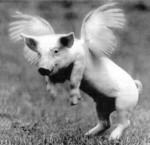| Wednesday, May 7, 2008 |
| Why Pigs Don’t Have Wings |
 Decoherence on Metafilter: Decoherence on Metafilter: Rutgers professor of philosophy Jerry Fodor created a bit of a stir last October when he wrote an article for the London Review of Books arguing that natural selection may not be such a great theory after all, and that a "major revision of evolutionary theory... is in the offing." Not many fellow philosophers and academics agree, it seems. Fodor responds to his critics here and here. Six months later, it's still not entirely clear whether his argument is, as Justin E.H. Smith put it, "irresponsible and stupid or so subtle that none of his adversaries, defending a status quo interpretation of the theory of natural selection, have been able to get it yet."I think that's a rather brilliant article by Jerry Fodor. He starts off in part by addressing that same issue I just commented on: What’s wrong with us is that the kind of mind we have wasn’t evolved to cope with the kind of world that we live in. Our kind of mind was selected to solve the sorts of problems that confronted our hunter-gatherer forebears thirty thousand years or so ago; problems that arise for small populations trying to make a living and to reproduce in an ecology of scarce resources. But, arguably, that kind of mind doesn’t work very well in third millennium Lower Manhattan, where there’s population to spare and a Starbucks on every block, but survival depends on dodging the traffic, finding a reliable investment broker and not having more children than you can afford to send to university. It’s not that our problems are harder than our ancestors’ were; by what measure, after all? It’s rather that the mental equipment we’ve inherited from them isn’t appropriate to what we’re trying to do with it. No wonder it’s driving us nuts.But his main point is to argue a bit against that fundamental and holy principle of evolution: natural selection. To summarize a bit: There are two fundamental, but distinct parts to the theory of evolution. 1. All life forms are evolving, later species and variants evolving from early forms, so we seem to have descended from monkeys, for one thing. 2. Evolution is happening by natural selection, i.e. by individuals and traits being selected for because they're better adapted to their environment. Nobody but religious nuts are disputing evolution according to #1. Most evolutionists also hold #2 as being an inseparable and self-evident component in evolution. But there are many more problems with that, as Fodor points out. Natural selection is normally presented as working exactly like how it works when somebody selectively breeds some plant or animal to cultivate particular traits. Purple roses, or fluffy short-nosed cats, etc. That selective breeding scenario is easy to understand. But the odd thing is when, in nature, it is coupled with the firm conviction that there surely is nobody there to do the selection. It is actually specifically and emphatically used to try to disprove that there's any mind involved, that there's anybody there who chooses anything. Fodor also thinks there's no mind involved and doesn't believe in God or Mother Nature. I personally would tend to think there has to be some kind of intelligence involved. Anyway, he's mainly addressing the lack of logic in the assumptions that natural selection happens based exclusively on adaptabtion to one's environment. He doesn't provide much of an alternative, but he points out that evolution would happen even without that. See, clearly, all traits aren't selected based on that they're a perfect fit for some environment. Some of them come along in the package of whatever else turns out to be advantageous. Animals that evolve to be more tame also turn out to have more floppy ears and more curly tails, even though that doesn't give them any obvious advantage. It is simply some traits that happen to be connected to the genes that relate to tameness. So, likewise, lots of traits might develop simply because they tag along with some other traits that get emphasized for one reason or another. So, pigs don't have wings, and have never had wings, and there have never even been any pigs who went extinct because wings weren't a good idea after all. Because wings would be pretty far from the package of traits that go into a pig. A whole bunch of things would have to change at the same time, and that's not where the evolution of pigs is pointed. I'm no biologist. But I do have a bit of a sense of what's logical and what is not. Evolutionary biology is full of anthropomorphisms that make no sense when coupled with the foregone conclusion that there's nobody there, no intelligence, that it is just all blind accidents. "Natural selection" implies that somebody selects. Genes can't be "selfish" unless they have some kind of mind. Nothing does anything "in order to" have a certain advantage unless there's something there that can make plans and choose among alternatives. So, either they haven't understood the actual mechanism that does this completely automatically, or they're missing the agent that does it. You can't really have it both ways. [ Nature | 2008-05-07 16:35 | 5 comments | PermaLink ] More > |